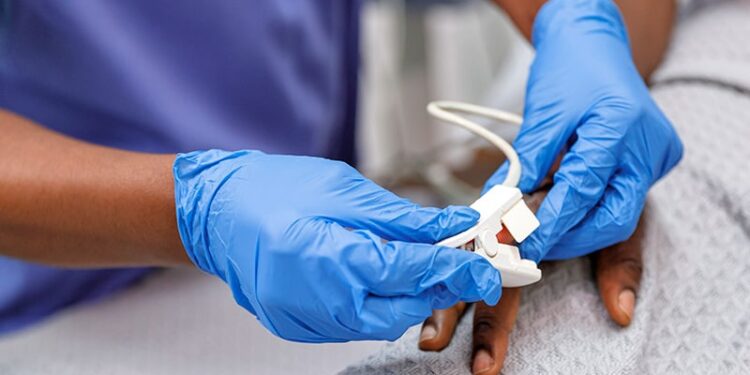Blood oxygen measurements taken with pulse oximeters in hospitals tend to be lower than they really are, according to the Equiox study, which was designed to assess the technology’s measurement capabilities in people with various skin tones.
“In a real-world study of critically-ill patients, the performance [of pulse oximeters] was worse than regulatory guidance standards,” said Carolyn Hendrickson, MD, a pulmonologist at the University of California San Francisco, and the study’s first author.
Regulators set standards that capture overestimation, underestimation, and precision, but the devices used did not meet these standards, said Hendrickson, who presented the findings at the American College of Cardiology (ACC) Scientific Session 2025 in Chicago.
The data showed that even when results were inaccurately low, they were higher in people with dark skin. Inaccurately high blood oxygen levels were also more likely in people with dark skin.
Shining a Light on Pulse Oximetry
Pulse oximetry uses light from LED sources to estimate arterial blood gases. As the light passes from one side of the finger to the other, it is sensed by a photodetector.
“We’ve known for decades that these devices perform differently in patients of different races and skin tones,” said Hendrickson. A 2020 study analyzed data from more than 48,000 patients, finding that the rate of hypoxemia not detected by pulse oximetry was nearly three times as high in Black patients as in White patients. A subsequent correspondence raised the question of whether that finding was due to the effects of skin tone on the measurement or was related to racial bias in healthcare.
The Equiox study, funded by the US Food and Drug Administration, was designed to explore this issue. Hendrickson and her colleagues measured the skin tone of 631 patients in intensive care units. This was performed objectively with a spectrophotometer and subjectively using a skin tone scale.
Pulse oximetry — measured 1760 times in the patients’ bedside — was compared with the more accurate method of measuring arterial blood gases. While patients were critically ill, with three-quarters on mechanical ventilation, most had blood oxygen levels in the 90th percentile.
The results were analyzed using a model that considered more than 40 factors that could affect readings including comorbid conditions.
Skin in the Game
Although pulse oximetry overall tended to underestimate blood oxygen levels, it did so less for patients with dark skin. At the same time, pulse oximetry overestimated true levels in 20% of measurements and was more likely in patients with dark skin and those who were Black individuals. Other health problems, such as diabetes, hypertension, smoking, and peripheral vascular disease, also increased the chance that pulse oximetry would overestimate blood oxygen levels.
Even though underestimation of blood oxygen gases means that true cases of hypoxemia would not likely be missed, Hendrickson explained that the chances of missing a case using pulse oximetry was higher in patients with darker skin. However, the study itself was not designed to determine why pulse oximetry produces higher estimates in people with darker skin.
Participants in this study were critically ill, but pulse oximetry is not routinely used in this population, noted Shelley Hall, MD, chief of Transplant Cardiology, Mechanical Circulatory Support, and Heart Failure, Baylor Health Care System, Dallas, and chair of the ACC Heart Failure and Transplant Council. However, she argued that the results lay the seeds for a new study of patients who have stable hypoxemia and are a more typical group for pulse oximetry measurement.
The Equiox team plans to expand the study to include patients with stable hypoxemia, patients with dark and very dark skin tones, and pediatric patients incorporating a diverse set of pulse oximetry devices.
Real-World Implications
This study may have unearthed the problem with pulse oximeters because of its prospective nature; previous trials have been retrospective. In light of these results, physicians should “pause” when making decisions based on pulse oximetry measurements and consider whether they can trust the data, Hendrickson said.
Should manufacturers or regulatory bodies be held accountable for the reliability of pulse oximeters, asked Paul Douglass, MD, a cardiologist at the Wellstar Health Group in Marietta, Georgia.
Currently, manufacturers test pulse oximeters on healthy volunteers, but Hendrickson suggested that oximeters be tested on ill patients as well. And people with darker skin should be better represented in validation groups before devices go to market, she added.
Source link : https://www.medscape.com/viewarticle/pulse-oximeter-results-unreliable-still-2025a10007qu?src=rss
Author :
Publish date : 2025-04-01 06:35:00
Copyright for syndicated content belongs to the linked Source.














